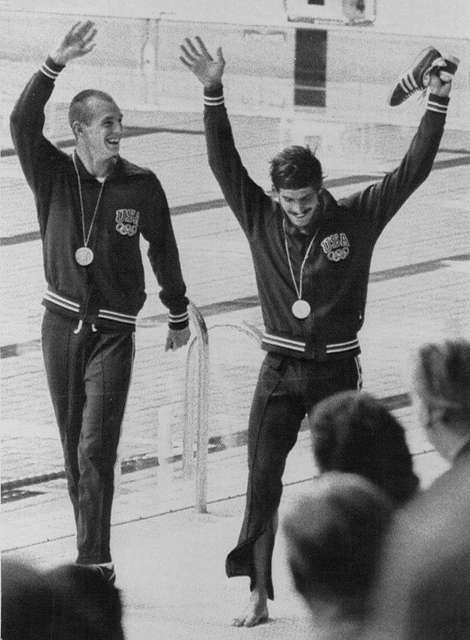by Brooke Kennedy
As with any of the Games, the Munich 1972 Olympics had plenty of memorable moments – and contenders – that dominated the headlines, especially in the swimming category. 52 nations participated, with the United States earning 43 medals, the most of any participating country, 7 of which were awarded to former record-holder Mark Spitz. More than 500 swimmers brought their A-game, and very few were granted the media fanfare that catapulted them to Olympic glory. But, a new docuseries is bringing the lesser-known journeys of storied Olympians like them into the limelight – including that of Steve Genter.
Having recently graduated from the University of California, Los Angeles, Steve Genter was an up-and-coming swimmer and a podium favorite against teammate Mark Spitz. A year prior, Genter participated in the 1971 Pan Am Games where he earned two golds and a silver for swimming, solidifying himself as formidable competition.
He entered the Games with a nagging cough, a result of bronchitis that developed from the Olympic trials. Just one week before his first scheduled event, the 200-meter freestyle, Genter expressed concern about a ‘gushy’ feeling in his chest. At a Munich hospital, medical professionals found that he had suffered a collapsed lung during training, requiring emergency surgery. But Genter was still determined to compete.

His operation was carried out without the use of sedatives for fear of a banned substance being found in his system that would disqualify him from competing. A chest tube was inserted to release the trapped air, and Genter took his determination a step further by squeezing rubber inflation balls for five days and nights. With the approval of both coaches and doctors, he took to the pool on August 29th for his first event, the 200 freestyle. Planning to build the first 100 meters, he took the lead with Spitz at his heels – until he, Genter, hit the 135 meter mark. A sharp pain pierced Genter’s chest, and ruptured stitches caused him to black out. But, he still swam on, and managed to cinch the silver medal in the end.
Genter was awarded a brief recovery period before returning to the water two days later in the 4 x 200 meter relay, securing himself another medal, this time a pristine, glistening gold. Later, on September 1st, Genter entered the 400-meter freestyle, placing third behind gold medalist and fellow teammate 16-year old Rick DeMont and silver medalist Australian swimmer Brad Cooper.
However, controversy soon followed DeMont’s victory. The young swimmer suffered from asthma, and he made it no secret that he used the medication Marax in his paperwork. Despite his honesty, US team doctors failed to investigate the ingredients in Marax, which if had been done, would’ve revealed that it contained a banned stimulant known as ephedrine. The result was a failed drug test and DeMont was stripped of his gold medal.
Refusing any wiggle room on the matter, the International Olympic Committee (IOC) declared Genter the 2nd place winner, but there was a catch. Either return his bronze medal and take his new place as the silver medalist, or risk a lifetime ban from competing in the Olympics. A moral dilemma that showed Genter’s true sportsmanship and compassion for his teammate and friend – he chose the latter. Though the official Olympic website credits Genter with a silver for that event, his bronze was the final Olympic medal he would ever earn.

However, Genter’s tale of persistence and heroism would remain obscured by the triumph of legendary swimmer Mark Spitz. At 22 years old, Spitz won 7 Olympic gold medals, setting a new record of most gold medals won in a single Olympiad (Michael Phelps would later surpass his record in 2008). But, in a new series, Genter’s story is getting a second look.
In the debut episode of his docuseries, ‘Conviction – The Steve Genter Story,’ John Macleod interviews the primary source. Assisting his story are fellow witnesses: his coach Jim Montrella, friend and fellow swimmer Mindy Dougherty, and the aforementioned Spitz and DeMont. Through the use of archival video footage, photographs, and news reports, MacLeod crafts the story of Genter’s victories from all angles, hammering home his dedication to the sport.
“For most of my life, the medals represented a defining moment in time,” said Genter. “Each medal is uniquely intertwined with the Olympic experience that makes those moments life long. I get goosebumps every time I recall those moments.”
Those impressed by Genter’s feats now have the opportunity to add his first and only Olympic medals to their collections. Now available at RR Auction, you can bid on Genter’s bronze, silver, and gold medals issued to him at the 1972 Munich Olympic Games.
“Now, the gold, silver, and bronze Olympic medals are going to help someone who I care deeply about. A defining moment… again.”


